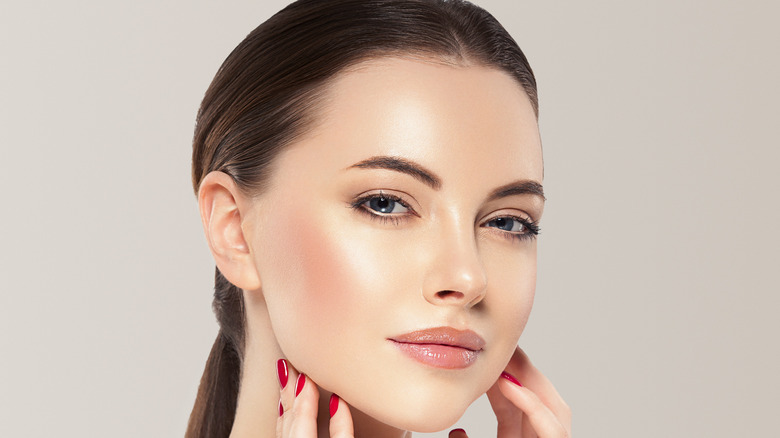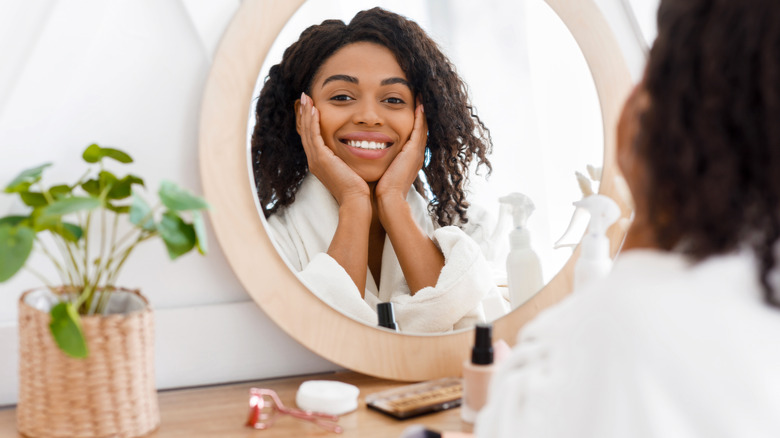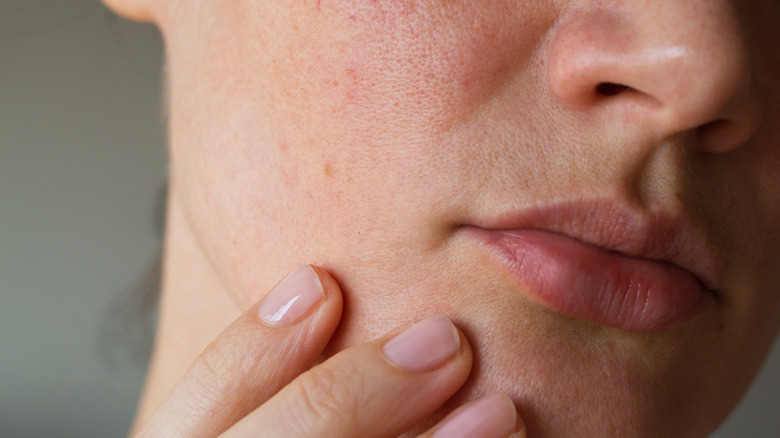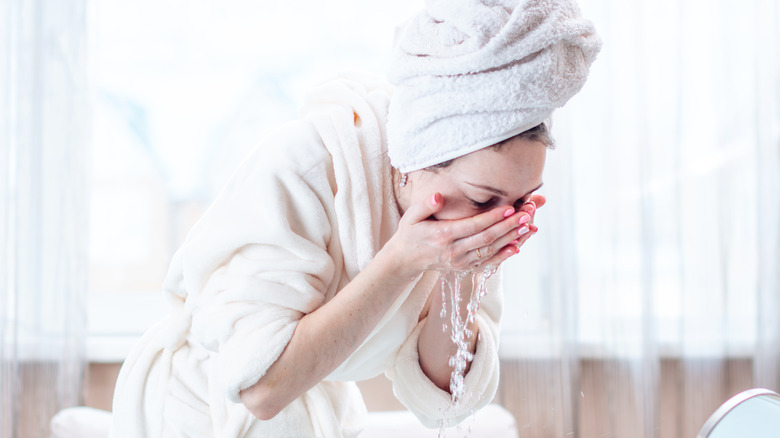How To Keep Your Skin Healthy While Wearing Makeup Every Day
Whether you're in your 20s or your 50s, it's important to know how to keep your skin healthy, especially if you wear makeup every day. Many cosmetics contain harmful chemicals that can clog your pores and speed up aging. Parabens, for instance, are widely used in makeup products. These preservatives have weak estrogen-like effects and may not be safe in the long run, according to Northeastern University.
Most women use about 12 beauty products every day, as noted by Harvard Medical School. These products are tested for safety, but their long-term impacts are still a bit unclear. Except for hair dyes and other beauty products containing color additives, cosmetics don't require approval from the Food and Drug Administration (FDA) before being released on the market. The FDA takes legal action only if a product is adulterated or misbranded.
Going bare-faced, however, takes a lot of hacks to pull off and for some, it isn't even an option. Some women use cosmetics to cover acne, rosacea, or scars. Others simply feel more confident when wearing lipstick, mascara, and other products. Either way, there's no need to go makeup-free if you don't want to. Use these tips to keep your skin healthy without giving up makeup.
Use clean beauty products to help maintain healthy skin
When it comes to conventional makeup products, you might not really know what you're putting on your skin. Lipstick and other lip products, for example, may contain lead, titanium, aluminum, chromium, and other heavy metals, as found in a 2013 study published in the Environmental Health Perspectives journal. As the researchers noted, these compounds may contribute to cancer, kidney disease, neurological problems, and reproductive disorders.
Cosmetics that are labeled "natural," however, are not necessarily safer. Dr. Ebru Karpuzoglu told PopSugar, "Since there is no regulation on the 'natural' term, anyone can just use one or two natural ingredients in a product and call it natural." Your favorite lipstick, for example, can be labeled as "natural" just because it contains shea butter. Also, it should be noted that the FDA doesn't regulate the term "organic" for cosmetics. Therefore, they may contain potentially harmful ingredients.
Ideally, opt for clean cosmetics. These beauty products contain no triclosan, formaldehyde, petroleum distillates, and other toxic chemicals, as noted by Harvard Medical School. You'll also want to check the label for parabens, talc, fragrances, aluminum, silica, and triclosan, as noted by Harper's Bazaar.
Talc, for example, is commonly used in eye shadow and face powder. This naturally occurring mineral may contain traces of asbestos, a known human carcinogen. Triclosan, an antimicrobial agent used in mascara and other products, may affect immune function, among other side effects. Plus, it's not an essential ingredient, as pointed out by the Mayo Clinic.
Choosing the right makeup for your skin type will help with skin health
While using quality cosmetics is important, you also need to choose products that match your skin type — your skin can tell you a lot about your health, so it's important to be mindful. Otherwise, you may end up with acne, dry skin, rashes, or blackheads. Oil-free foundations, for instance, are best for those with oily or combination skin, according to makeup artist Faith Lawless (via Byrdie). Ideally, look for water or powder-based formulas.
If your skin is dry, choose an oil-based liquid foundation. Use a moisturizing cream or face mask before applying foundation and powder, as it helps hydrate your skin. Opt for hypoallergenic makeup products if you have sensitive skin and eyes. These cosmetics tend to be gentler on the skin and have fewer ingredients, as explained by Healthline. Conventional makeup products typically contain fragrances, retinol, benzyl alcohol, chemical sunscreens, and other ingredients that can irritate the skin.
Some people are allergic to specific ingredients in makeup products. Common symptoms of allergic reactions to makeup may include hives, rash, eye irritation, or flaking skin. In severe cases, you may experience anaphylaxis, a life-threatening allergic reaction (via the FDA). Hypoallergenic and allergy-tested cosmetics won't necessarily prevent these issues. However, they are less likely to cause allergic reactions than regular cosmetics.
Tweak your beauty routine to keep your skin healthy
Small things, such as removing your makeup before going to bed, can make it easier to keep your skin healthy. As a general rule, clean your makeup brushes at least once a week. Apply sunscreen before leaving home, even if it's dark outside. The National Institutes of Health recommends using sunscreen with a sun protection factor (SPF) of 30 or higher.
If you have acne, you can still wear makeup, but you may need to take extra steps to protect your skin. The American Academy of Dermatology Association suggests using cosmetics labeled as oil-free or non-comedogenic. Use a gentle cleanser twice a day to unclog your pores and remove dead skin cells.
While it can be tempting to use homemade face creams and skin treatments, these products are not always safe. Essential oils, for instance, may have estrogen-like effects, as noted by Harvard Medical School. Baking soda, a common ingredient in homemade scrubs, can irritate the skin and remove its protective oil barrier, via Healthline. Instead, use plain water and a gentle face wash with basic ingredients.



